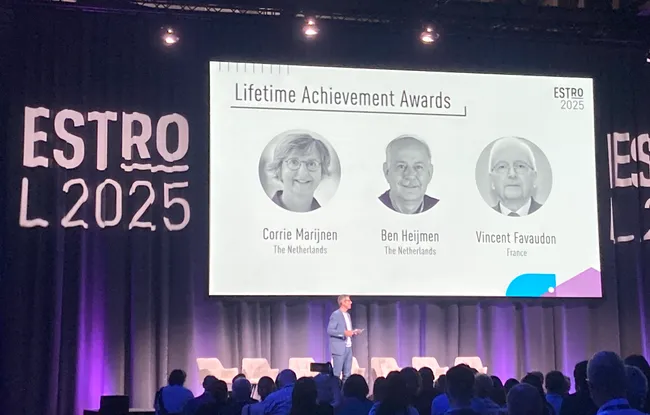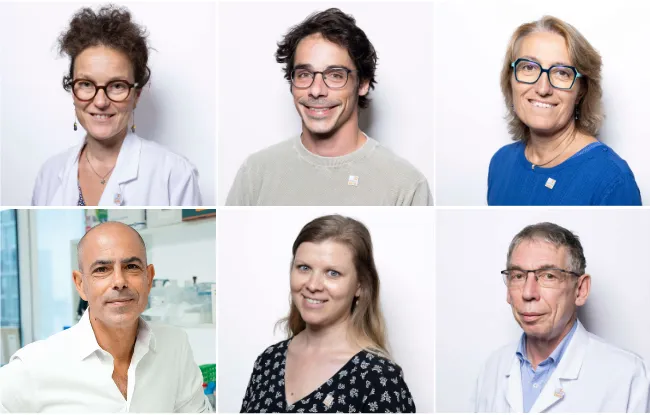- Home >
- Institut Curie News >
- Dr. Vincent Favaudon receives the ESTRO 2025 Lifetime Achievement Award
Dr. Vincent Favaudon, Emeritus Research Director in the DNA Repair, Radiations and Innovative Cancer Therapies team (CNRS UMR3347 / Inserm U1021 / Université Paris-Saclay), has been honored with the ESTRO (European Society for Radiotherapy and Oncology) 2025 Lifetime Achievement Award. The award was presented in Vienna on May 2, during the society’s annual congress. This prestigious distinction recognizes a remarkable scientific career, marked by major contributions to radiobiology, most notably the discovery of the FLASH effect.
“Receiving this distinction is a deeply moving honor. It is also a recognition of the collective work carried out with my colleagues over many years. Seeing that our research resonates internationally—and most importantly, that it is opening new perspectives for patients, for radiobiology, and even for industry—is a source of great pride,” said Dr. Vincent Favaudon.
Trained in mathematics, chemical physics, and biochemistry, Vincent Favaudon earned his PhD from Université Paris Cité (formerly Paris-VII) in 1973, following research at the Muséum national d’Histoire naturelle in Paris focused on flavin dismutation reactions—key redox processes in cellular biology. He completed postdoctoral fellowships at both the Muséum and the University of Konstanz, Germany.
In 1977, he joined Institut Curie in Orsay, where he was appointed Inserm Research Director in 1988. He became head of the Radiobiology research team in 1991 and, in 2004, founded and led Inserm U612, now known as the Signaling, radiobiology and cancer unit (CNRS UMR3347 / Inserm U1021 / Université Paris-Saclay). His research has since focused on the effects of radiotherapy, particularly in the context of combination therapies.
Named Emeritus Research Director in 2010, Dr. Favaudon has authored over 90 original research articles in peer-reviewed journals, including PNAS, Cancer Research, Clinical Cancer Research, Radiotherapy and Oncology, International Journal of Radiation Oncology Biology and Physics, Nucleic Acids Research, and Science Translational Medicine.
A Revolutionary Discovery: The FLASH Effect
In 1995, Dr. Vincent Favaudon observed an unexpected impact of dose fractionation on in vitro cells, which he termed the “W” effect. This was one of the first biological applications of pulsed radiolysis at ultra-high dose rates and led to in vivo studies on its antitumor efficacy. After several years of research and initial presentations in 2009, he published pivotal results in Science Translational Medicine in 2014. These findings highlighted the phenomenon now known as the FLASH effect: ultra-high dose-rate radiation delivered in extremely short timeframes that destroys tumor cells while sparing healthy tissue.
Whereas conventional radiotherapy delivers radiation at approximately 1 Gray per second, FLASH irradiation administers ≥10 Gray in under 100 milliseconds—up to 10,000 times faster.
Results obtained in preclinical mouse models showed that a conventional 15 Gray dose of lung irradiation consistently led to the development of pulmonary fibrosis between 8 weeks and 6 months post-treatment. In contrast, following FLASH irradiation, no fibrosis was observed below 20 Gray. This protective effect was also observed in apoptosis, blood capillaries, and skin lesions, while the antitumor efficacy remained unchanged.
This reproducible phenomenon—confirmed by numerous studies reporting similar observations across various healthy tissues and tumor models, including the brain—suggests the existence of a novel therapeutic window and paves the way for a redefinition of irradiation protocols. Since 2014, research in this field has expanded rapidly, with nearly 600 publications to date.
Today, the FLASH effect is central to new clinical strategies such as FLASH radiotherapy using very high-energy electrons (FLASH-VHEE), whose development was officially launched in February 2025 with the FRATHEA project (Flash Radiation THerapy Electron Acceleration), led by Institut Curie in collaboration with the CEA.
Institut Curie extends its warmest congratulations to Dr. Vincent Favaudon on this award, which celebrates a truly exemplary research career and a pivotal contribution to innovation in radiobiology.
Each year, the Lifetime Achievement Award is presented by the ESTRO Board of Directors to individuals who have devoted their professional lives to radiation oncology and to supporting the Society’s mission. The award honors long-term scientific and human commitment, and recognizes the lasting impact of such careers on the advancement of the discipline. It is presented during ESTRO’s annual congress, which brings together the international radiotherapy community.
FRATHEA: the new era of FLASH radiotherapy opens up at Institut Curie
©ImagesAltourProduction
Learn more
- The story of a revolutionary discovery at Institut Curie
- FRATHEA, FLASH radiotherapy at Institut Curie
- FRATHEA: a project of unparalleled scope in FLASH radiotherapy
- Institut Curie enters a new era of FLASH radiotherapy
- Pauline Vaflard, Stéphane Guitton et Vincent Favaudon, lauréats du prix Curie 2022



